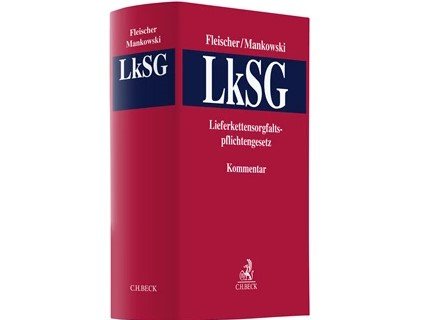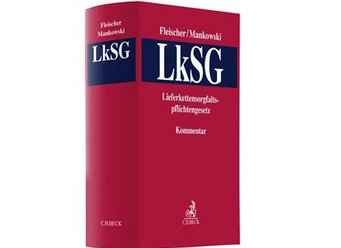
Commentary on Supply Chain Act
Orientation for a demanding interdisciplinary topic
Germany is the world's third-largest import nation. The Supply Chain Due Diligence Act (LkSG), adopted by the German Bundestag on 11 July 2021, was preceded by long and difficult debates. For some, the law is a milestone in the fight against exploitation and environmental destruction in developing countries. For others, the legislation creates unreasonable burdens and competitive disadvantages for local companies. In addition, there are many unresolved legal issues, making factual orientation all the more important.
The entry into force of the LkSG on 1 January 2023 will be followed shortly thereafter by the publication of a major commentary analysing the legislation, a substantial part of which has been written by a team led by Institute Director Holger Fleischer. In addition to Fleischer, the authors include Claas-Lennart Götz, Philipp Alexander Hülse, Christian Kolb, Stefan Korch, and Christian Stemberg, researchers who are working at the Institute and contributing their own scholarship. The work is a joint project that was conducted in partnership with Peter Mankowski, Chair of Civil Law, Private International Law and International Civil Procedure, and Comparative Law at the University of Hamburg, along with his research team. Professor Mankowski, who died unexpectedly on 10 February 2022, is a posthumous co-editor of the commentary.
Complex Interrelations
The LkSG obliges companies to respect internationally recognized human rights standards and certain environmental standards; it will affect companies with more than 3,000 employees in Germany as of 2023 and companies with more than 1,000 employees as of 2024. In particular, the legislation aims to combat child labour, slavery and forced labour, disregard for occupational health and safety, the withholding of an adequate wage, disregard for the right to form trade unions, denial of access to food and water, and unlawful deprivation of land and bases of livelihood.

”In terms of both scholarly analysis and the provision of legal advice, it is necessary to adopt a cooperative and intradisciplinary approach that has regard for the relevant legal disciplines.“
– Institute Director Holger Fleischer –
The new obligations are thus rooted in international law. But how can companies become addressees of international law provisions? What are the sanctions? Which state's law applies to liability claims in relation to international supply chains? Which court has jurisdiction?
The LkSG encompasses a variety of legal fields. Its provisions see corporate and business law, contract law, private international law and international civil procedure law, as well as public law and international law intersect and come together. In addition, the legislation also includes criminal law provisions.
"In terms of both scholarly analysis and the provision of legal advice, it is necessary to adopt a cooperative and intradisciplinary approach that has regard for the relevant legal disciplines," says Fleischer. His working group has for several years been conducting research on issues arising in connection with the corporate social responsibility debate. The topic of "business and human rights" has emerged from this larger context and now represents a collaborative field of research.
International Context
With the LkSG, Germany is following the path of several European countries that have enacted analogous legislation in recent years. In terms of ensuring compliance with the law, different paths are being taken. While the French Loi de vigilance act from 2017 introduced civil liability in the event of non-compliance with due diligence obligations in respect of human rights, Norway relies entirely on sovereign enforcement by the national consumer protection authority in the Transparency Act it adopted in 2021. German lawmakers have similarly opted for public enforcement.
At the heart of modern supply chain laws in France, Norway and Germany is human rights due diligence, a process which is designed to guard against human rights violations and environmental risks. It is related to general corporate risk management and creates new links between stock law, regulatory law, and supply chain law.
"The new European laws are the second generation of national regulations on supply chain responsibility," Fleischer explains. "They were, for example, preceded in 2010 by the Dodd-Frank Act and the Transparency in Supply Chains Act in California, and in 2015 by the UK's Modern Slavery Act. This first generation of supply chain legislation did not go further than human rights reporting requirements. As such, it contributed greatly to raising awareness, but it has reached its limits in terms of actually implementing its objectives."
A Commentary and Handbook in One

The work that has been edited by Fleischer and Mankowski is more than an academic commentary. Three extensive chapters introducing the subject matter precede the commentary on the individual paragraphs of the act. The introductory chapters discuss the origins of supply chain law under international law and its international development. The relatively dramatic development in Germany is described in detail – from the 2016 "National Action Plan for Business and Human Rights" to the first draft for a Due Diligence Act in 2019 to the 2021 legislative resolution in the Bundestag. The CSR Directive and the Conflict Minerals Regulation of the EU as well as the current proposals for an EU directive on supply chains are also subjected to close examination. In the framework of a comparative survey, the world’s existing regulatory regimes, ranging from reporting and due diligence obligations to tort liability, are presented and systematically classified. A separate chapter is devoted to the conflict-of-law aspects of international supply chains.
Sustainable Transfer of Knowledge
The foundations for this collaborative work were laid over the course of several years of research. Long before the commentary project commenced, tangible findings had already been made. In numerous articles, Fleischer and his team examined national, international, and supranational regulations in terms of companies’ responsibility to protect against human rights violations and environmental risks. Given the practical reach of the topic, the appropriateness of expanding this foundation into a commentary became apparent. "Legal practice is governed by commentaries," says Fleischer. "We want to bring our research to bear also in those places where it is needed on a daily basis."
Prof. Dr. Dr. h.c. Dr. h.c. Holger Fleischer, LL.M. (Michigan), has since 2009 been a Director at the Institute and an Affiliate Professor at Bucerius Law School. He earned his post-doctoral degree (Habilitation) in 1999 from the University of Colognie and was Professor of Civil Law, Commercial and Business Law and Comparative Law at the Universities of Göttingen and Bonn. In 2008 he won the Leibniz Prize of the Deutsche Forschungsgemeinschaft (DFG). He has edited and authored numerous handbooks and commentaries on commercial law, corporate law and capital markets law and is, in addition, a co-editor of multiple legel journals.
Holger Fleischer, Peter Mankowski (†) (eds.), Lieferkettensorgfaltspflichtengesetz Kommentar,
C. H. Beck, München, 683 pp., appearing in March 2023 (published in German)
Further Reading
Header image: © shutterstock / Red Monkey
Portrait Holger Fleischer: © Max Planck Institute for Comparative and International Private Law / Johanna Detering













